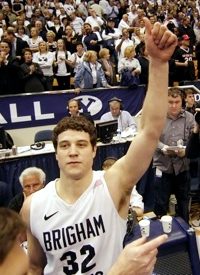
March Madness is here! It’s that eagerly-anticipated time of the year when college basketball aficionados fill out NCAA Men’s Division I Championship tournament brackets and watch them get busted.
This season, however, many hoops fans are also wondering how far the Brigham Young University Cougars — who have enjoyed a wildly successful season, thanks in no small measure to shooting guard Jimmer Fredette (pictured, left) — will advance in the dance, since one of the team’s key players (sophomore Brandon Davies) was recently suspended from the team for the duration of the season.
Thus far, the Cougars have danced into the Sweet Sixteen; they will be playing the University of Florida Gators in New Orleans on Thursday, March 24.
As you have probably heard, Davies violated the part of BYU’s (which is affiliated with the Church of Jesus Christ of Latter Day Saints and located in Provo, Utah) famously strict honor code, which requires students to be sexually “chaste.” Given the notoriously libertine environment that personifies the college jock culture (and one that coaches and administrators wink-wink at), this modern scarlet lettering of a 6-9 starting forward was one for the ages.
Unexpectedly, an organ of the liberal oligarchy — Time magazine — came out on the side of BYU in this morality play-by-play. In a piece titled “Brandon Davies: Is BYU’s Premarital Sex Controversy Good For College Sports?” writer Sean Gregory shows that this unusual exercise in loco parentis came with a price.
Gregory states:
BYU has every incentive to just slap Davies on the wrist for his transgression. A successful run at the Final Four could generate millions of dollars in television revenues and alumni donations for the school, and the added exposure and prestige can increase applications.
BYU boosters, however, believe the Davies incident could be a selling point on its own, by broadcasting the school’s principled stand on honesty and taking responsibility. Davies himself has apologized to his teammates and took his punishment without complaining. And despite the stiff penalty it levied, BYU also teaches forgiveness.
Indeed, the school has kept it classy and balanced. After the suspension was doled out, Davies didn’t sequester himself. In fact, he was spotted at a recent Cougars game, sans uniform, dispensing water to his teammates. He received a standing ovation, again sans uniform, at another game.
Gregory quotes several heavyweights, who are former BYU athletes, like San Francisco 49ers quarterback Steve Young and Vai Sikahema (who also played in the NFL), who expressed their support for the tough love standard.
BYU, it’s fair to say, is doing its part to help young people become a statistic.
Here’s what I mean: Based on data gathered between 2006 and 2008 by the National Center for Health Statistics, researchers concluded (since their last study in 2002), that there is an increase in sexual abstinence for Americans between the ages of 15 and 24. Restraint as the potential new cultural zeitgeist means fewer sexually transmitted diseases, ill-conceived pregnancies, abortions of convenience, and emotional meltdowns. Nothing wrong with that.
Some day Brandon Davies may publicly share what he thought about having his hormones benched, and if he really does concur with his elders that engaging in sex outside marriage isn’t the wisest choice.
It is clear that prospective recruits who are toying with the idea of accepting an athletic scholarship from the Mormon private school and aren’t keen on agreeing to their character contract have been sent an unambiguous message: Our way, or the highway.
In truth, the highway, or the secular collegiate alternative, continues to be a perilous place for scores of unfettered, high testosterone star athletes, since there is no law in the moral arena, and old-fashioned adult mentoring is sparse.
Based on the Time story, though Brigham Young University’s chances of winning on the basketball court may have been diminished, they can still win in the court of public opinion.
Photo: BYU’s Jimmer Fredette celebrates after BYU’s win over San Diego State’s at an NCAA college basketballgame in Provo, Utah, Jan. 26, 2011: AP Images



